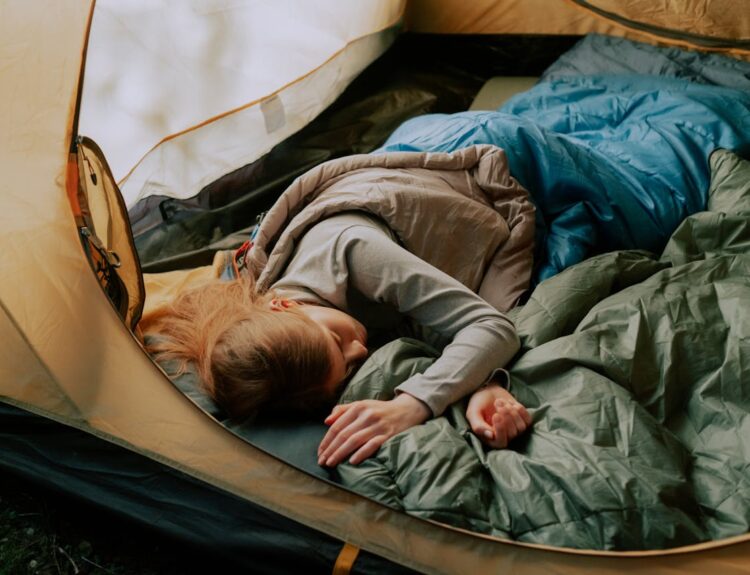Can you get sick from sleeping in a hot room? The answer may reshape the way you think about your nightly sanctuary. In pursuing a good night’s sleep, we often focus on the importance of a comfortable mattress or the perfect pillow. However, the temperature of the room we rest in plays a silent yet significant role in our night ritual.
Can you get sick from sleeping in a hot room? Explore the surprising link between room temperature and your health.
In this article:
- The Relationship Between Temperature and Sleep
- Can You Get Sick from Sleeping in a Hot Room in Winter?
- Can You Get Sick from Sleeping in a Hot Room in Summer?
- Connection Between Sleep, Immune System, and Sleeping in a Hot Room
THE RELATIONSHIP BETWEEN TEMPERATURE AND SLEEP
The environment we rest in plays a pivotal role in achieving restorative rest. The relationship between temperature and sleep is a critical aspect often overlooked. Research consistently indicates that the ideal sleeping temperature falls within the range of 60-67°F (15-20°C), fostering conditions that promote the body’s natural sleep-wake cycle.
A cooler room temperature helps initiate the body’s natural sleep process by signaling the release of melatonin, the hormone responsible for regulating sleep. Elevated room temperatures, on the other hand, can disrupt this delicate balance, leading to difficulties falling and staying asleep.
Furthermore, the body undergoes a natural drop in core temperature during sleep, and a colder environment facilitates this process. When the room is too warm, the body struggles to release excess heat, resulting in discomfort and restlessness.
Creating an optimal sleep environment by regulating room temperature within the recommended range is a simple yet effective way to enhance sleep quality and promote overall health and well-being.
CAN YOU GET SICK FROM SLEEPING IN A HOT ROOM IN WINTER?
As the temperatures drop during winter, the allure of a warm and cozy sleeping environment becomes ever more enticing. However, the question arises: Does sleeping with the heater on lead to illness? While the immediate connection between warmth and comfort is apparent, it’s crucial to consider the potential health impacts of elevated room temperatures, particularly during the colder months.
Many households rely on central heating systems during winter to combat the chill, inadvertently elevating indoor temperatures. Contrary to common belief, sleeping in a hot room during winter may not necessarily protect you from seasonal illnesses. It might even pose certain health risks.
One notable concern is the impact on respiratory health. A hot and dry room can contribute to dry mucous membranes in the respiratory tract, making individuals more susceptible to respiratory infections such as colds and flu. Moreover, hot environments can lead to dehydration, as the body expels moisture through sweating and breathing. Dehydration can compromise the immune system, potentially increasing vulnerability to viral infections.
It’s essential to balance comfort and health during the winter months. While staying warm is critical, it’s equally crucial to maintain a temperature that supports respiratory health and hydration. Optimal sleep conditions involve keeping the room comfortably cool, allowing for a restful night’s sleep without compromising the body’s natural defenses against winter ailments.
CAN YOU GET SICK FROM SLEEPING IN A HOT ROOM IN SUMMER?
Sleeping in a hot room during summer may lead to various health considerations. One primary concern is the challenge it poses to achieving optimal sleep. High temperatures can disrupt the body’s natural thermoregulation process, making it difficult to cool down and enter restful sleep. As a result, individuals may experience restless nights, leading to daytime fatigue and diminished overall well-being.
Moreover, the risk of dehydration becomes pronounced in hot sleeping environments during the summer. Excessive sweating and increased respiratory effort contribute to fluid loss, potentially leading to dehydration. It affects sleep quality and can compromise the body’s immune system, making us more susceptible to illnesses.
Respiratory health is another aspect of sleeping in a hot room during summer. The heat can create a dry environment, irritating the respiratory tract and potentially exacerbating conditions such as allergies or asthma.
To mitigate these risks, prioritize a cool and comfortable sleep environment. It may involve using fans, air conditioning, or other cooling mechanisms to regulate room temperature. In the video below, you can watch more tips on ensuring better sleep during hot summer nights.
CONNECTION BETWEEN SLEEP, IMMUNE SYSTEM, AND SLEEPING IN A HOT ROOM
To delve deeper into the inquiry, “Can you get sick from sleeping in a hot room?” it’s crucial to unravel the intricate relationship between sleep and immunity. The role of quality sleep in bolstering the immune system is multifaceted, and disruptions in sleep patterns, often triggered by elevated room temperatures, can have specific implications for immune health.
Promoting Immune Response through Quality Sleep
Adequate and restful sleep is a cornerstone for nurturing a robust immune system. During periods of quality sleep, the body orchestrates the production of essential elements like cytokines, which act as signaling molecules regulating immune responses. This intricate process enhances the body’s ability to recognize and combat potential threats, contributing to overall immune resilience.
Discomfort and Sleep Disruption in Hot Environments
The environment where we sleep influences the quality of our rest. A hot room introduces discomfort that extends beyond mere inconvenience. It becomes a disruptor, hindering the seamless transition into deep, restorative sleep stages. This disruption compromises the rejuvenating benefits of sleep. It impacts the immune system’s efficiency, which relies on uninterrupted rest for optimal function.
Dehydration’s Impact on Immune Function
Elevated temperatures in the sleeping environment create conditions conducive to dehydration. The body expels moisture through sweating and increased respiratory effort, and this fluid loss can impede the optimal functioning of the immune system. Adequate hydration is fundamental for supporting immune responses, and when compromised by a hot room, it contributes to immune inefficiency.
Heightened Susceptibility to Infections
The synergy of discomfort and compromised sleep quality in a hot room elevates the risk of infection susceptibility. As the immune system’s defenses weaken under these conditions, the body becomes more susceptible to invading pathogens. The heightened vulnerability underscores the critical role of maintaining an optimal sleep environment in fortifying the body against potential health threats.
_____
So, can you get sick from sleeping in a hot room? The answer is absolutely yes. Take proactive steps to regulate room temperature, stay well-hydrated, and establish consistent sleep routines. Your immune system and overall health will thank you.
This post may contain affiliate links. You can read the affiliate disclosure here.








